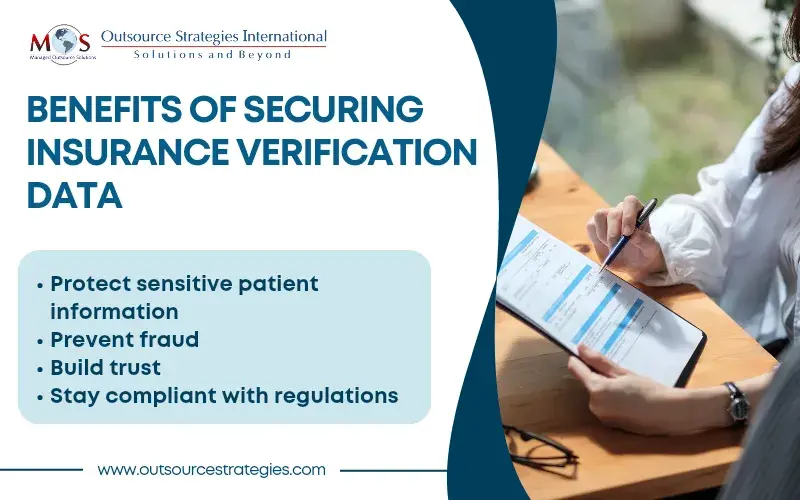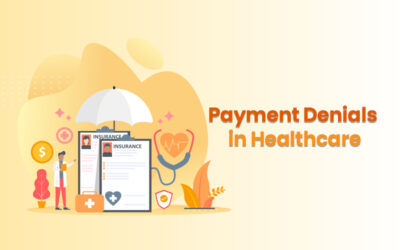Blockchain technology generates a data structure with integral security characteristics based on the principles of cryptography, decentralization and consensus. IBM defines blockchain security as “a comprehensive risk management system for a blockchain network, using cybersecurity frameworks, assurance services and best practices to reduce risks against attacks and fraud.”
Blockchain technology has the potential to play a significant role in securing insurance verification data. Let’s explore the impact of blockchain on data security in insurance checks.


Streamline your patient eligibility checks with our secure, cutting-edge authorization and insurance verification services.
Importance of Securing Sensitive Insurance Verification Data
The importance of securing insurance verification data cannot be overstated. This data includes personally identifiable information (PII) of policyholders, such as names, addresses, social security numbers, and contact details. If compromised, it can have severe consequences for individuals, insurance companies, and the industry as a whole.
Leveraging technology can greatly improve the overall efficiency and reliability of insurance processes. As the industry continues to evolve, prioritizing data security with technologies like blockchain becomes a critical aspect of maintaining a robust and trustworthy insurance infrastructure.
Benefits of Using Blockchain Technology in Health Insurance Verification
Blockchain is a distributed ledger technology that consists of a chain of blocks, each containing a list of transactions. These blocks are linked and secured through cryptographic hashes, forming a decentralized and transparent network. With this immutability and transparency, blockchain technology offers a highly secure way of storing and managing health insurance verification data. Blockchain can enhance data security in the following ways:
High level of data privacy and security
Blockchain ensures strong privacy protection for sensitive data. In public blockchains, cryptographic techniques safeguard data privacy while still enabling authorized parties to verify transactions. Private blockchains, specifically useful for insurance verification, limit access to only authorized participants, boosting data security and privacy.
Enhanced data integrity
With blockchain, each transaction or piece of data is securely encrypted, timestamped, and linked to the previous transaction, forming a chain of blocks. Once data is recorded in a block, it cannot be altered or deleted without being detected. This significantly reduces the risk of fraud and unauthorized changes to insurance verification records.
Decentralization for increased resilience
Traditional centralized databases store information on a single server or database, making them vulnerable to hacking and data breaches. Blockchain operates on a decentralized network of nodes, with each node holding a copy of the entire chain. This decentralization makes it highly resistant to single-point failures or attacks and enhances the overall security of the system.
Transparency and traceability
Transparency is crucial in the insurance industry, where accuracy and reliability are paramount. Blockchain’s transparency and traceability features provide a clear and auditable trail of insurance verification transactions. All participants in the network have access to the entire history of transactions, which helps prevent fraud and promotes accountability and trust among stakeholders. Insurance verification data stored on a blockchain can be easily audited and verified, improving the efficiency and security of the verification process.
Smart contracts
Smart contracts are self-executing contracts with the terms of the agreement directly written into code. These contracts can be programmed to trigger actions automatically when predefined conditions are met. Smart contracts can automate tasks such as identity verification, policy validation, and claims processing. This reduces the need for manual intervention and minimizes errors while maintaining a high level of security.

Want to explore the latest trends and innovations in insurance verification?
Read our blog post: Emerging Trends and Innovations in Insurance Verification.
Despite creating an immutable record of transactions, experts highlight that malicious actors can exploit recognized weaknesses in blockchain infrastructure, and this has led to hacks and fraudulent activities over the years. Using blockchain technology for securing insurance verification data depends on implementing a model that focus on addressing governance, business value and technology needs while assuring privacy, trust and security.


Secure, hassle-free patient eligibility verification is just a phone call away!





